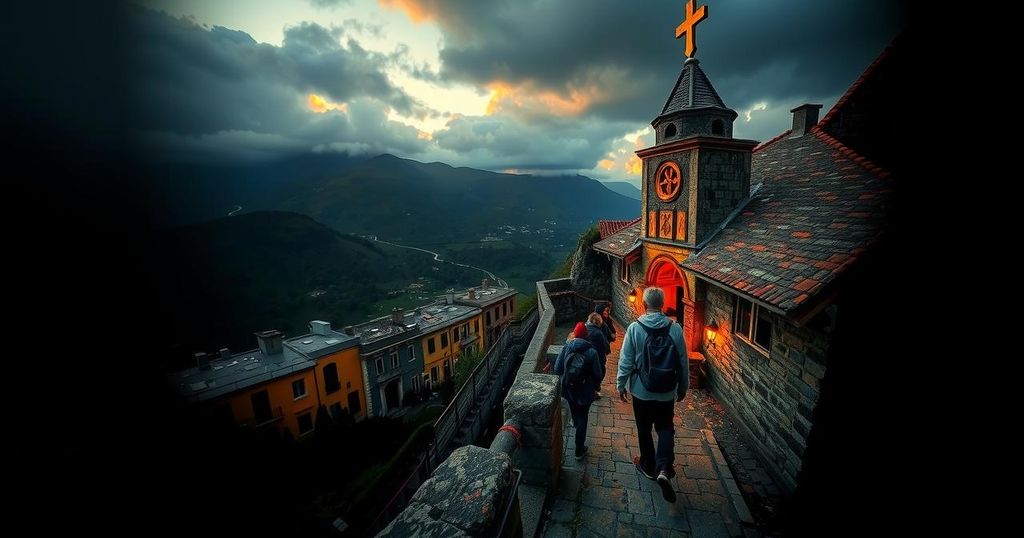Navigating Kairos Moments: Lessons from the Camino de Santiago

Recent political upheavals have led to a significant re-evaluation of leadership in the context of impending elections. Drawing inspiration from the Camino de Santiago pilgrimage, the author conveys vital lessons for navigating societal challenges, emphasizing the importance of core values, preparation, and the influence of ancestral support during transformative Kairos moments.
In contemporary electoral politics, the tumultuous landscape has presented us with myriad challenges, exemplified by attempted violence against political figures, pivotal withdrawals, and significant shifts in leadership dynamics. In this context, we are experiencing what many religious traditions interpret as “Kairos” moments—times steeped in potential for transformative societal change. The idea of Kairos is deeply embedded in history, often marking moments filled with divine potential, urging us to reflect on our behavior and guiding us to utilize our time to foster liberation, love, and justice as mandated by divine teachings. During a recent ten-day pilgrimage along the Camino de Santiago—a historical pilgrimage route traversing Spain, France, and Portugal—I gleaned profound insights relevant to our societal journey. For over a millennium, individuals have undertaken this pilgrimage seeking healing, enlightenment, and a deeper connection with their faith. My experiences along the Camino illuminated essential leadership lessons rooted in understanding the past, present, and future. Firstly, as I navigated the physical challenges of the Camino, particularly traversing precarious heights, I learned the importance of grounding myself in core values and beliefs rather than getting overwhelmed by external dangers. This realization underscored the necessity for individuals to maintain a focus on their foundational principles to confront today’s uncertainties effectively. Secondly, I recognized that adequate preparation plays a crucial role in equipping us to face future challenges. Despite my training for the physical demands of the pilgrimage, unanticipated difficulties arose. Nonetheless, my prior experiences furnished me with instinctual skills that proved invaluable, reminding us that while we strive to prepare, divine providence often aids us in ways we fail to foresee. Lastly, the presence of family and ancestors became palpable during my journey. One particular instance involved hearing a familiar tune reminiscent of my grandfather, which evoked strong emotional connections, reinforcing the notion that we are not alone. Just as I felt my loved ones accompanying me, so too do we share the journey toward justice and peace with those who have come before us. The struggles and triumphs of those who preceded us inspire our efforts today. As we operate within this current moment of societal opportunity, characterized as Kairos, it is imperative to acknowledge our role as leaders in promoting justice and peace. Drawing from personal narratives and collective histories, we can navigate our paths more effectively. Remaining anchored in our values, leveraging acquired wisdom, and recognizing the shared journey provides us the fortitude to effect change.
The article addresses the political chaos surrounding recent electoral activities, including significant events involving high-profile politicians and national conventions. Within this context, the author draws parallels between the recent political climate and the spiritual concept of “Kairos”—an opportune moment for transformation and action. By reflecting on personal experiences from a pilgrimage on the Camino de Santiago, the author extrapolates lessons of grounding, preparation, and connection to ancestry applicable to contemporary societal challenges.
This exploration of the Camino de Santiago illustrates that as we navigate the complexities of our times, focusing on core values, embracing preparations for the future, and recognizing our communal journey can empower us to lead meaningfully in our quest for justice and peace. Each shared experience strengthens our resolve, reminding us that no journey is undertaken in isolation; rather, we carry the collective hopes and legacies of those who came before us.
Original Source: www.americamagazine.org








